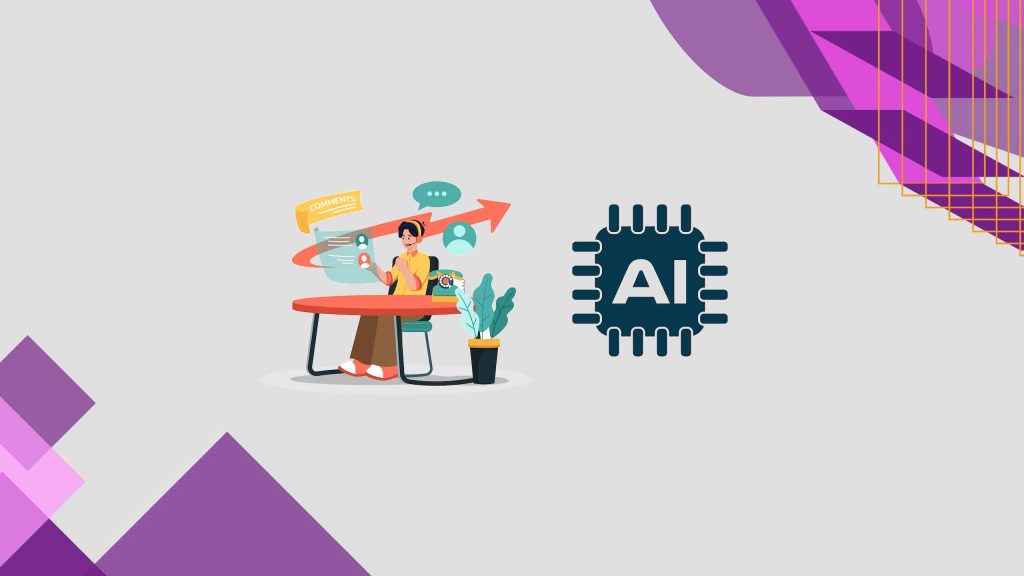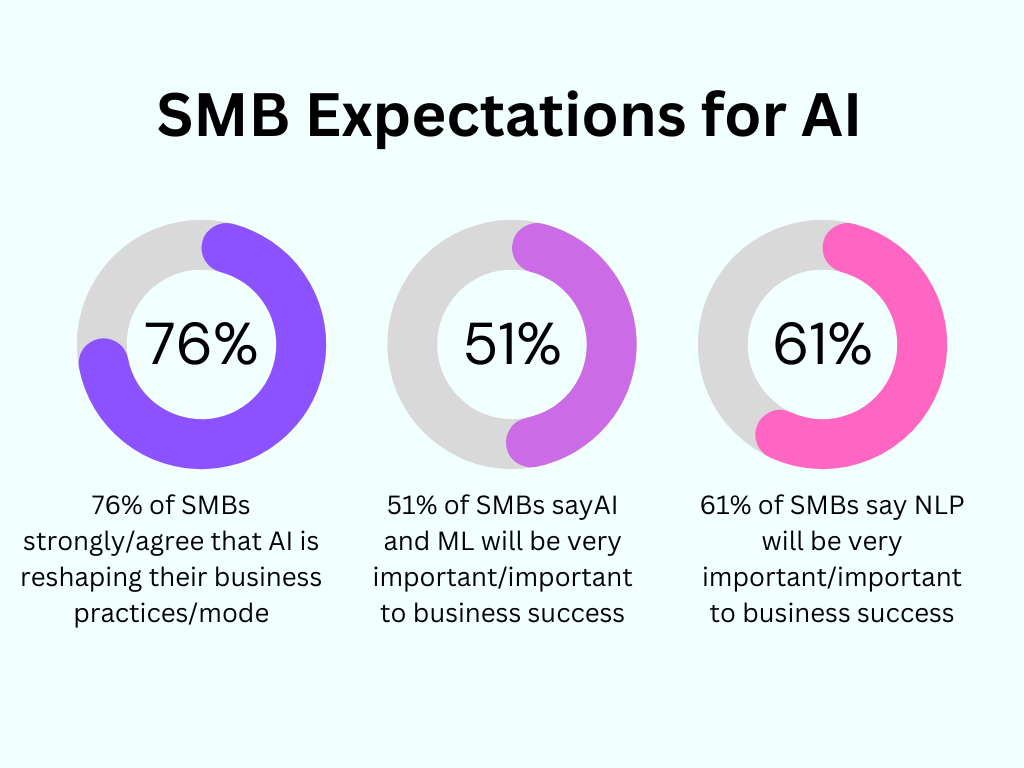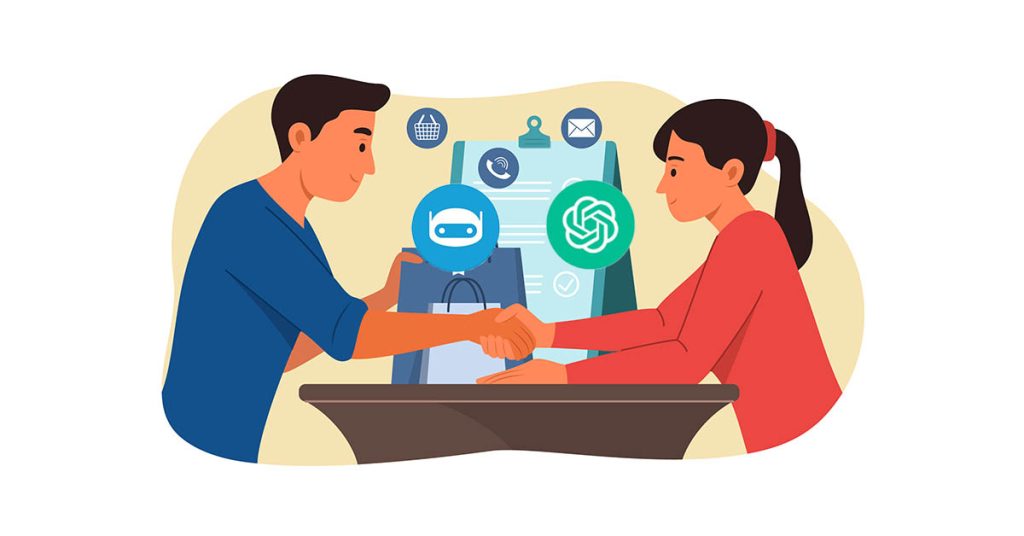
The Importance of AI
AI has become an indispensable part of our everyday lives, gently (and smartly) nudging us towards a more streamlined and efficient future. From our morning latte orders to our evening commutes, AI’s sophisticated algorithms and predictive powers are there, quietly humming in the background. Everyday we are seeing news stories of corporations embracing the AI future, either building and incorporating AI tools into their workflows.
AI integration however isn’t just for mega corporations, Small businesses are also getting their time to shine and they don’t need a Google-sized budget to reap the benefits of AI. On the contrary, incorporating AI can pave the way towards a more sustainable future for small business – a future where processes are smoother, customers are happier, and the world is, frankly, a little bit greener.
The Growing Importance of AI for Small Businesses
Statistics and figures highlighting the adoption of AI by small businesses
Artificial Intelligence is no longer just a big business game. According to a study by Oracle and SMB Group in 2019, 76% of small to medium businesses (SMBs) believed AI was already having a significant impact on their industries, making it an essential factor for survival. By 2022, 65% of CIOs were predicting that AI would be integrated into ERP systems with 54% of SMBs already using AI technologies in their businesses. Not too bad for what was considered a sci-fi fantasy not long ago.

Understanding the Potential of AI
The Various Forms of AI
Firstly, let’s break down this AI buzzword that’s flying around. AI isn’t just one thing; it’s an umbrella term that encompasses a range of technologies. Machine Learning (ML) is one, where computers learn from data without explicit programming – it’s like they’re having their ‘Eureka!’ moments. Natural Language Processing (NLP) is another form, helping computers understand and respond to human language – think of it like teaching your computer to speak ‘human’. Each of these technologies has distinct applications and potential benefits for small businesses.
The Potential Impact of AI on Different Business Sectors
And the potential impact of these AI forms is massive. In retail, AI can personalize the shopping experience or manage inventory. In finance, it can detect fraudulent transactions. In manufacturing, it can improve quality control and streamline supply chains. So no matter your business’s sector, chances are there’s an AI solution that could have a major impact. Kind of like finding out there’s a perfect ice cream flavor for everyone, isn’t it? And just like ice cream, AI seems to make everything a bit better.
AI for Operational Efficiency
How AI can streamline operations and increase efficiency
One of the many talents of AI is its ability to streamline operations. Imagine having a tireless, ultra-efficient team member who’s working 24/7 and doesn’t even ask for a coffee break! AI can automate repetitive tasks and manage emails, making your business processes faster and freeing up human resources for tasks requiring that special human touch.
For instance, AI chatbots can handle customer queries round the clock, or an AI scheduling system can ensure that appointments and resources are managed without a hitch. It’s like having a super-efficient personal assistant who’s always on top of their game, helping you save time, money, and a whole lot of headaches.
Case studies of Small Businesses Benefiting from AI in Operations
To put this into perspective, let’s turn to real-life stories. ‘Glofox’, a small gym management software company, uses AI to automate administrative tasks, freeing up time for gym owners to focus on their customers.
‘DoNotPay’, an AI legal assistant, helps users contest parking tickets without needing to understand complex legal jargon. These are not just businesses leveraging AI but smart businesses running efficiently while offering unique services. So remember, operational efficiency is just an AI implementation away!

AI for Enhanced Customer Engagement
The Role of AI in Improving Customer Interaction and Personalization
When it comes to understanding customers, AI is like your most intuitive salesperson on steroids. It’s capable of parsing vast amounts of data to draw insights about your customers’ preferences, behaviors, and needs. This, in turn, allows businesses to personalize their interactions and create experiences tailored to each customer. Think of it like having a personal stylist who knows your wardrobe better than you do!
AI chatbots can provide instant customer service, while AI-driven recommendation engines can suggest products or services based on a customer’s past behavior. It’s like a friendly salesperson who knows just what the customer wants, even before they do.
Case studies of Businesses Using AI for Customer engagement
Let’s take ‘Bloom & Wild’, a UK-based online florist. They use AI to offer personalized flower recommendations based on customer preferences and purchase history. The result? Increased customer satisfaction and repeat business.
Then we have ‘Kuki’, a chatbot developed by London-based firm Volume Ltd. Kuki handles 98% of their customer queries, making customer interactions seamless and efficient.
AI can be that secret ingredient that takes your customer engagement from standard to “wow”.

AI for Improved Decision-Making
How AI Can Help in Data Analysis and Informed Decision-Making
Data is the new oil, and AI is the new drill. AI technologies have the ability to sift through vast amounts of data, spot trends, and extract meaningful insights – all at a speed and accuracy that would make even the sharpest human mind a bit green with envy.
From predicting future sales to identifying potential market gaps or analyzing customer sentiment, AI gives small businesses the power to make informed decisions based on real-time data. It’s like having a crystal ball, but one that’s powered by algorithms instead of magic.
Real-World Examples of Businesses Using AI for Data-Driven Decision-Making
Let’s look at ‘Narrator AI’, a small business that provides AI-driven data analysis. They help other businesses turn their raw data into understandable and actionable stories. Similarly, ‘Zest AI’ helps lenders make faster and more accurate decisions on loan applications using AI. Both these companies highlight how AI can be used to make informed decisions that can have a big impact on a business’s bottom line.
In the world of small business, AI isn’t just an advantage; it’s becoming a necessity. As we say in the AI world, “data is the king, but AI is the kingmaker”.
AI and Sustainability
How AI Can Contribute to Building a Sustainable Future
Sustainability isn’t just a buzzword, it’s a necessity. Thankfully, our AI buddy is here to help. By optimizing resource use, reducing waste, and enhancing efficiency, AI can contribute significantly to a more sustainable future. Imagine a future where we have smart energy grids that optimize power use, or AI systems that reduce food waste by predicting demand accurately. Sounds like a sci-fi utopia, doesn’t it? But with AI, it’s all within reach.
How AI Can Help Businesses Reduce Their Environmental Footprint
Several small businesses are already leveraging AI to reduce their environmental impact. ‘FarmBot’, for instance, uses AI for precision farming, reducing water and fertilizer usage. ‘AMP Robotics’ uses AI to identify and sort recyclable materials, improving waste management.
These businesses are not only succeeding in their respective markets, they’re also paving the way towards a more sustainable future. They’re proof that with the help of AI, small businesses can not only ‘go green’, but also ‘grow green’.
The Future of AI in Small Businesses
Predicting the Future Role of AI in Small Businesses
As we move forward, the role of AI in small businesses is expected to expand even further. Automation, customization, and data analysis are just the tip of the AI iceberg. As the technology continues to evolve, we can expect AI to play a role in virtually every aspect of running a small business, from human resources and project management to sales and marketing. The future, it seems, is not just small and beautiful, but also smart and AI-powered.
It’s clear that AI and small businesses make a powerful team. Small businesses can leverage AI to improve efficiency, engage customers, make informed decisions, and contribute to a sustainable future. The AI future isn’t an intimidating dystopian novel but a promising story of growth and innovation.
Practical Steps for Small Businesses to Adopt AI
Identifying the Business Areas That Can Benefit from AI
Start by taking a look at your business processes and identify areas where AI could make a difference. It could be anything from customer service with chatbots to inventory management with predictive analytics. Remember, the first step towards AI adoption is identifying where it could help.
Exploring Different AI Tools Available for Small Businesses
There’s a whole universe of AI tools out there designed with small businesses in mind. Explore tools like Zia, Zoho’s AI for customer relationship management, Definite for data analysis, or Mayday for smart scheduling.
Consult with an AI Expert or Consider Hiring for AI Skills
Don’t shy away from seeking expert help. Consulting with an AI expert can provide valuable insights and guidance on your AI journey.
Pilot AI Implementations and Measure Their Impact
Start small and measure the impact. Implement AI solutions in a controlled setting and monitor their performance. Don’t forget, Rome wasn’t built in a day, and your AI transformation will take time, patience, and iterative improvement.
Full-Scale Implementation and Continuous Learning
Once you’re satisfied with the pilot results, you can go ahead with full-scale implementation. But remember, adopting AI is not a one-and-done deal. Make sure that you have the right staff on consultant to train your AI assistant so that it continues to grow with your business.
Kevin is a digital marketing expert with a previous 10 years worth of experience working in IT. He understands the nuances of sourcing the right IT resources to drive results for organizations.
